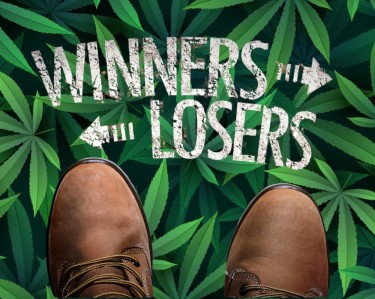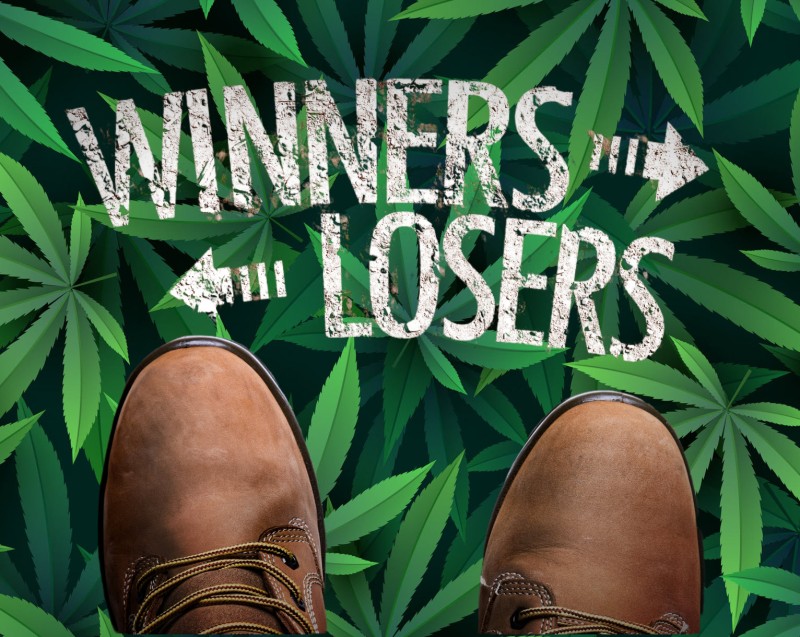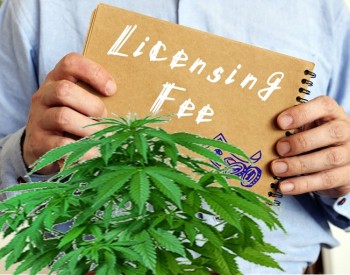
Cannabis to Schedule 3? Who are the Winners, the Whiners, and the Losers?
It has been over a week so how do you feel about the possible move coming for marijuana to go from a Schedule 1 drug to a Schedule 3 drug on the CSA?
The industry has been volleying opinions back and forth so I won’t bore you with the “it’s great, it’s not great” debate, you can read that stuf pretty much all over, including a nice piece by Cannabis Tech as they talked to 19 cannabis leaders about the HHS recommendation here. Cannabis.net also had a legacy stoner write up his opinion on the change and what it means in a piece called, “Lipstick on a Pig”.
In case you aren’t an avid follower of the weed industry or have been off the grid for a few weeks, let me update you on the big cannabis news. The Department of Health and Human Services has formally recommended that the Drug Enforcement Administration (DEA) reduce federal restrictions on marijuana despite its continued federal illegality. However, 40 states permit its use to varying degrees.
This action comes after President Joe Biden's order to the leading health organization to carry out a thorough assessment of marijuana, which was given 11 months ago. The HHS recommends moving cannabis from being classified as a Schedule I drug to a Schedule III drug under the Controlled Substances Act.
According to the DEA, cannabis is classified alongside other Schedule I substances, such as heroin and LSD. This classification implies a perceived high potential for abuse and a lack of recognized medical utility.
If this recommendation became law, it would mark a huge and fundamental divergence from cannabis's existing classification as a Schedule I drug. This categorization would change how people view marijuana by separating it from high-risk substances like heroin and recognizing its possible medical uses.
The HHS Recommendation to Reschedule
An HHS spokesperson conveyed that they promptly responded to the directive by submitting their recommendation to the DEA on August 29th.
Assistant Secretary for Health Rachel Levine stated that her recommendation was grounded in a thorough review by the Food and Drug Administration regarding the classification of marijuana. This review had been pledged following President Biden's October pardon of federal offenses related to simple possession. At that time, President Biden tasked the HHS secretary and the U.S. Attorney General with assessing the federal scheduling of marijuana.
Cannabis would significantly change if the DEA reclassified it as a Schedule III substance, including the elimination of an IRS provision that forbade drug traffickers from deducting their business expenditures from their taxes (280E as it is so affectionately known as in the cannabis industry). The marijuana sector might be able to save hundreds of millions of dollars annually because of this change. According to NBC News, small business owners have stated that their inability to deduct what are normally thought of as regular business expenses is their biggest financial difficulty.
Now that HHS has made its recommendation, all attention is on the DEA, which holds the ultimate authority over substance scheduling. The DEA, not a historical fan of cannabis, could take years to review and make a decision.
According to five sources familiar with the planning, the Biden administration had aimed to announce the drug's rescheduling in the Fall to coincide with the election cycle in 2024, approximately a year after the president's request for the review. The duration of the DEA's public review process remains uncertain at this point.
In response to inquiries, a DEA spokesperson confirmed, "We can confirm DEA received a letter from the Department of Health and Human Services providing its findings and recommendation on marijuana scheduling, pursuant to President Biden’s request for a review." The spokesperson also stated, "DEA will now initiate its review."
When questioned about the recommendation during a news briefing on Wednesday, White House press secretary Karine Jean-Pierre emphasized that the review is an independent process led by HHS and the Department of Justice. She declined to comment on President Biden's current stance on the federal decriminalization of marijuana.
Response/Reactions to The Recommendation
The response to the HHS recommendation has garnered strong support within the corridors of Capitol Hill. In a statement, Senate Majority Leader Chuck Schumer commended HHS for taking a decisive step in the right direction. He urged the DEA to swiftly follow suit, emphasizing the importance of this move in significantly reducing the harm caused by stringent marijuana laws. Senator Schumer, a Democrat from New York, stressed that there remains a considerable legislative agenda to dismantle the federal cannabis prohibition and roll back the War on Drugs.
Advocates of marijuana legalization perceive this initial action as a momentous milestone. It signifies the federal government's formal recognition of cannabis's medical contributions for the very first time.
The Cannabis Industry Association emphasized the necessity of further harmonizing federal law with states where marijuana is legal while acknowledging the historical significance of the suggested reclassification. According to CEO Aaron Smith, delisting cannabis from the Controlled Substances Act and regulating it similarly to alcohol will ultimately address the complex issues arising from the federal-state conflict.
As both political parties look to use this issue as a political wedge in the run-up to the 2024 presidential election, relaxing federal marijuana laws also has political relevance. The majority of Americans support legalization, according to polls taken year over year since 2016.
Reps. Matt Gaetz, Greg Steube, and Brian Mast, all Republicans from Florida, have openly advocated for the drug to be rescheduled and urged the Biden administration to prioritize the endeavor. Although Florida voters legalized medicinal marijuana usage last year, Florida Governor Ron DeSantis has stepped up his opposition to decriminalizing and legalizing marijuana on the presidential campaign trail this week. The Florida Supreme Court is debating whether a ballot measure legalizing marijuana will appear in 2024.
Additionally, there is a bipartisan initiative underway in Congress aimed at simplifying the provision of banking services to legitimate cannabis businesses.
Senator Schumer has emphasized that passing the SAFE Banking Act, as it's known, will be of utmost importance when the Senate reconvenes in September. However, the potential for a government shutdown could pose challenges to this object bill’s proponents of the bill to resolve a deadlock that emerged concerning the August recess.
One of the primary reasons why cannabis enterprises continue to struggle with limited access to financial services, obstacles in conducting medical research, and restrictions on the interstate transportation of products approved for medical use in numerous U.S. states is the current Schedule I classification of marijuana. Despite the widespread acceptance of medical marijuana, only the FDA possesses the legal authority to approve medications for medical use throughout the United States.
Bottom Line – Who are the Winners, the Whiners, and the Losers?
Winners – The cannabis industry in general, the black market, and MSOs. One, regardless of what you think schedule 3 will ultimately mean, pharma taking over the whole industry or not, it is better than a schedule 1 drug, period. If you are a conspiracy theorist and believe this is Big Pharma’s move to control prescriptions and the industry, so be it, time will tell, but getting cannabis off the “spend the rest of your life in prison” drug list, is the #1 win of the whole thing, let the chips fall where they may in the future. This writer does not feel this is the trojan horse some have made it out to be and Big Pharma will rule cannabis forever going forward. 3 < 1, win!
The second biggest winners, and a groan will go out from all the legacy cannabis people, the MSOs, or multistate operators will be BIG financial winners in this one. Basically, the bigger your expenses and operation, the more damage 280E and the inability to write off any of those expenses, did to your bottom line. If you reverse that same equation and take 280E off those financial statements, all those expenses now become tax write-offs, saving the MSO hundreds of millions of dollars in tax credit or refunds. We caught wind of this strategy at the Benzinga Cannabis Conference where it was mentioned that none of the MSOs were actually paying the taxes, they were kicking the can down the road hoping for a descheduling or rescheduling of the drug. Once that happened, they could go to court and say they should have never paid those taxes in the first place as cannabis is no longer a schedule 1 drug, and at this point, that bat bleep crazy strategy actually worked! MJ BIZ picked up on this same theme recently in their article on the cash windfall coming to companies for the 280E tax classification change.
Third place winner, the black or illicit cannabis market. While already booming in the US and around the world, any instance of lessening of the punishment for getting caught selling or shipping cannabis will only encourage more aggressive business behavior. For example, if you get caught shipping 20lbs of a schedule 1 drug from California to New York, you were looking at life in jail. If that changes to a fine or something much less severe, you remove a disincentive, in economic terms, to not take an action. Hence, the opposite is true, you created more of an incentive to take chances, push the limits to get more profit because the punishment for getting caught will be much less severe. (Schedule 3 illegal drug shipment compared to a Schedule 1). The illicit market should sleep well at night if this change is made because the possible punishment for growing weed without a license and selling it out of your van or shipping it over the internet will not be much less than any time since 1952. There is now economic inventive for the illicit market to push the limits on growing, sending, and pricing, as getting caught “won’t be so bad” in historical perspective.
Fourth Place Winner – International Markets – UN drug treaties be damned as Canada and Colombia have already shown the world, as they have been shipping cannabis internationally for months if not years now, but any change to the “severity of US listings of the drug”, will only increase risk from companies in other countries to push the boundaries of international and US law. Anything that dissipates the sting of that law will only encourage more business aggression in shipping and growing cannabis. Similar to the black-market argument above, if the fines and repercussions are lessened by the US and the UN, you are inviting more risk and aggressive behavior to try and make a profit.
Honorable Mention Winner – The rumor and speculation mill. Ever since the announcement by the HHS, the rumor mill about what could happen, secret plans, what it really means, wake up people, don’t get fooled, happiest day of my life, stuff is going off the rails. One rumor is that it will only apply to medical marijuana and recreational will still be a schedule 1 drug. Hard to do since THC is the actual cannabinoid on the Schedule 1 list, so lowering it to schedule 3 would affect both recreational and medical. The biggest rumor is the cannabis industry will be place in the hands of the FDA and Big Pharma like we all feared from day #1 and all the local growers and providers will be shut out of the industry. Fat chance. They have been trying to shut down illegal cannabis since 1952, no luck, now legal in over 40 states in some form or another. Don’t count of the FDA and DEA hiring thousands of agents to try and snuff out state-legal cannabis operations and public companies.
Losers – It is hard to find a loser when you go from a schedule 1 to a schedule 3 drug without going into fear mongering about the FDA and Big Pharma. In general, MSOs are going to have way more cash and profits, so that won’t bode well for smaller companies trying to compete with the big boys. Those that want cannabis descheduled will hoot and holler, but that was never really a viable option. You aren’t going from “schedule 1 like cocaine and heroin” to “unscheduled like peanut butter” overnight. Cannabis does pass through the blood-brain barrier and get you high, it does impair your senses and alter your thoughts and concept of reality for a bit while using it, so descheduling, while sounding nice, was never really on the table unfortunately.
Interstate commerce is the next massive shoe to drop, so not sure how Schedule 3 will affect those companies that had to “silo” their whole operation in each state, having to go from seed to sale and production in each state they enter. If interstate commerce is opened up, then the industry will finally start to reach a state of economic equilibrium as you will know the price of a Snoop Leaf or Chong’s Choice blunt in California and Massachusetts. You will also know the fair price of a pound of Emerald Triangle legal weed vs a pound of Emerald Triangle illegal weed.
Whiners - The cannabis industry proletariat that are screaming “rescheduling is not enough, we need descheduling!”. These are the same people that say, “cannabis isn’t a drug, it’s a plant”. First off, almost all drugs come from plants or did in their infancy. Nicotine, caffeine, heroin, cocaine, and opium all “come from plants” and they are clearly drugs, so yes, cannabis is a plant and a drug. Its cannabinoids pass through the blood-brain barrier and get you high, it is a drug and plant, move on.
The words “don’t settle for rescheduling” have been part of many op-ed pieces about the HHS news, and for some reason, these people think the US government and the cannabis industry are some sort of equal parties or in negotiations about this subject. As Binder says in the Breakfast Club movie, “Not even close, bud!”. The word “settle” implies some sort of negotiations or bartering of the details, which is just not the case in the US government vs the marijuana industry. There are no negotiations or evidence the US government gives one iota what the marijuana industry wants, so to say “don’t settle” is a bit rich. It is like being at your sentencing in front of judge where you get 2 years in jail and saying, “I won’t settle for that, I want less!”. Umm, yeah, it doesn’t work that way, the US government is the judge, and they decide the status of cannabis based on voters and future election results that the present party in office is worried about, not what the marijuana industry wants to see.
What if we all decide “not to settle for Schedule 3”? Now what? Oh yeah, nothing we can do since as a group we have very limited power and influence in politics. The industry is an outlier, we have cut lobbying money down to the bare bones in DC, no one of influence cares what we want or think, they are looking out for votes and power-broker money, think about what Big Tobacco and Big Pharma want, that is what is on their minds as they write the big checks in DC.
It isn’t up to us to settle; we sound like bratty little kids who just got their first dinner in months and are complaining it didn’t come with a dinner roll and desert. Take the Schedule 3 W when and if it comes and live to fight another day. Win the battle and keep fighting the war.






